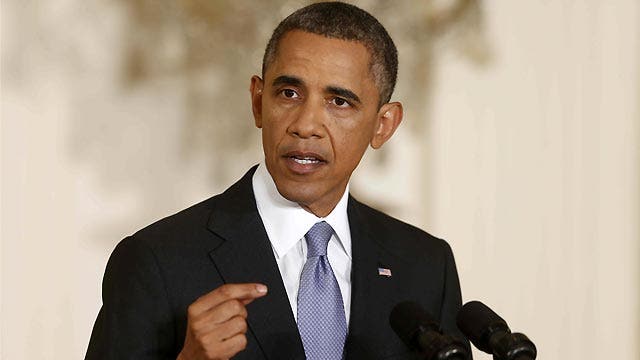President Obama addresses NSA program at news conference
President: We can take steps to make sure civil liberties have an independent voice
President Obama's pledge to work with Congress on "appropriate reforms" for parts of the National Security Agency's surveillance programs came under scrutiny Friday from some Republicans and skeptical Democrats.
Surveillance programs that allow the government to collect basic information about phone calls and email communications have been under scrutiny since NSA leaker Edward Snowden revealed classified programs in June. The government has defended these programs as necessary to prevent terror attacks.
Obama on Friday acknowledged the domestic spying has troubled Americans and hurt the country's image abroad. But he called it a critical counterterrorism tool.
"I am comfortable that the program currently is not being abused," Obama said. "I am comfortable that if the American people examined exactly what was taking place, how it was being used, what the safeguards were, that they would say, 'You know what? These folks are following the law.'"
His most significant proposal would create an independent attorney to argue against the government during secret hearings of the Foreign Intelligence Surveillance Court, which reviews requests for surveillance inside the U.S. As it stands now, prosecutors alone can go to the court and make their case unopposed.
Obama is also creating an outside advisory panel to review U.S. surveillance powers. He did not say who would be on that panel but over the past week, the president met secretly with technology business leaders, some of whom cooperated with the government surveillance and were unhappy to see their companies named in leaked government documents.
Obama said the NSA would hire a privacy officer and his intelligence agencies would build a website explaining their mission.
As the president spoke, the Justice Department released what Obama called "the legal rationale" for the surveillance. But the document was not a legal analysis and amounted primarily to a recitation of what the administration has already told Congress.
New York Republican Rep. Peter King, the former chairman of the House Homeland Security Committee, said Friday that Obama's promise to overhaul parts of the NSA's programs amounted to a "monumental failure in presidential wartime leadership and responsibility."
"These programs are legal, transparent and contain the appropriate checks and balances among the executive, legislative and judicial branches of our government. These intelligence tools keep Americans safe every single day," King said in a statement.
A spokesman for House Speaker John Boehner, R-Ohio, a vocal supporter of the intelligence-gathering programs, criticized the president's "reluctance to sufficiently explain and defend" the surveillance operations.
"Transparency is important, but we expect the White House to insist that no reform will compromise the operational integrity of the program. That must be the president’s red line, and he must enforce it. Our priority should continue to be saving American lives, not saving face,” spokesman Brendan Buck said in a statement.
Senate Intelligence Committee Chairwoman Diane Feinstein of California.said her committee plans to conduct a "major review" of the NSA's surveillance programs and develop proposals to increase transparency and improve privacy protections.
Feinstein was one of several lawmakers, including Democrats Mark Udall of Colorado and Ron Wyden of Oregon, who met with the president earlier this month to discuss their concerns about the NSA.
“I am pleased the president shares the committee’s commitment to improving the public’s confidence with more transparency and more privacy protections. This is the right thing to do," Feinstein said in a statement Friday.
Udall, who has proposed legislation that would limit the government's ability to collect data on Americans, said he welcomed the president's pledge to work with Congress on addressing his concerns about the surveillance programs.
"This is an important first step — but I will keep fighting to ensure it's not the Administration's last in this direction. The administration must do a better job balancing our national security with our constitutional privacy rights," Udall said in a statement.
Even with the proposed changes, Obama will have to persuade Congress to reauthorize the Patriot Act in 2015.
"This is how we're going to resolve our differences in the United States," Obama said, "through vigorous public debate guided by our Constitution, with reverence for our history as a nation of laws, and with respect for the facts."
Rep. Jim Sensenbrenner, R-Wis., one of the authors of the Patriot Act, has said the law was never meant to authorize such broad surveillance. Following Obama's speech, Sensenbrenner's spokesman said the congressman would propose a new law to "rein in the dragnet collection of data by the NSA."
The White House chose to announce the changes and release the documents on a Friday afternoon in August when Congress was on vacation and much of Washington had cleared out.
The Associated Press contributed to this report.












































